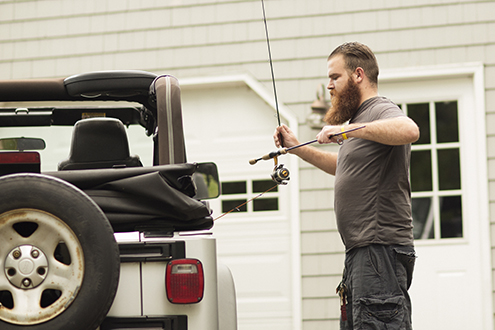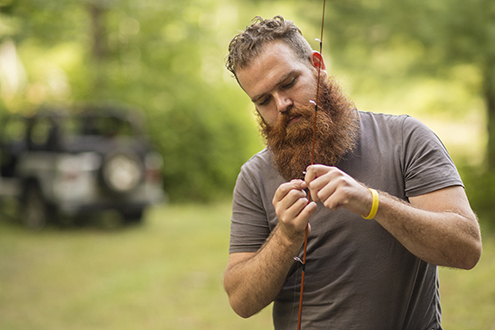Robert Ruzzo
At 28, Near-Fatal Heart Condition Revealed Family History
Adopted, patient was unaware of aortic dissection genetic link
Robert Ruzzo was running through drills at his Air National Guard base in Quonset when he felt a sudden sharp pain in his chest. Ruzzo, 26 at the time, was taken to a local hospital, but an evaluation found nothing significant wrong. A doctor chalked the episode up to a respiratory infection.
A year and a half later, the Coventry resident suffered two more episodes of crushing chest pain, and a brief emergency department stay. He was soon rushed to Rhode Island Hospital when physicians decided he required the specialized care of Rhode Island Hospital and the Brown University Health Cardiovascular Institute.
Imaging revealed that Ruzzo was suffering from an aortic dissection, a torn inner layer of the main vessel that carries blood from the heart. The tear was allowing blood to force its way between the other layers of the vessel wall. About 20 percent of aortic dissection patients die before reaching a hospital, and the chance of survival ticks downward with every passing hour.
Ruzzo and his parents learned grim news: Ruzzo could suffer a fatal rupture of his aorta, or dangerous disruption of blood flow to other vital organs including his brain, if he didn’t have surgery soon.
The surgery is risky, with mortality rates for patients with additional health issues running upwards of 30 percent. However, Ruzzo was young, athletic, and otherwise healthy, so his outlook was better than most. Ruzzo and his family quickly agreed to the seven-hour open-heart surgery.
The operation was a success. Ruzzo credits the entire care team for his successful recovery.

“For surgery and while I was recuperating at Rhode Island Hospital, I received excellent care (from) the nurses, the CNAs. If I wanted to go for a walk, get a drink, anything I needed, they were there,” says Ruzzo. Being the youngest patient on the adult cardiac unit took some getting used to. “I was 46 years younger than the next youngest patient I met. It was pretty comical,” he recalls.
“After going through what I was told was about 10 percent chance of survival ... I’ve had a mindset change. I want to enjoy my life. Be responsible – go to work and pay my bills – but also take every opportunity to go to the beach, spend time with family and friends," said Robert Ruzzo.
Ruzzo, a water filtration service technician, returned to work three months after surgery, and following months of progressive physical rehabilitation, his energy has returned.
Ruzzo’s case was rare. Most aortic dissections are a result of deterioration over time, often due to high blood pressure, and usually occurring in patients in their 60s or 70s. In the unusual case of someone as young as Ruzzo suffering from the condition, it is often the result of a birth defect or a genetic tissue disorder. More rarely, aortic dissection can result from trauma, such as a car accident or another type of severe blow to the chest, which had not happened to Ruzzo.
The care team at Rhode Island Hospital believes a genetic component likely was to blame, but it has not yet been pinpointed.
Ruzzo was adopted as a young child. While he does have a relationship with his biological mother and was aware of her own heart trouble, he didn’t know about a possible genetic component until later. As it turned out, his biological mother had undergone a repair for an aortic dissection a few years before his own surgery. Ruzzo later learned that his maternal grandmother and great-grandmother had also suffered aortic dissections.

After recovering, Ruzzo had a comprehensive genetic workup conducted at Rhode Island Hospital to try to determine the root cause of his aortic dissection. He is hopeful that more information will provide insights to his siblings and, maybe one day, his own children.
Now, a year later, Ruzzo is feeling well and regaining strength. He takes a different approach to things now, too, maybe a little wiser than his 29 years.
“After going through what I was told was about 10 percent chance of survival and about two hours to live if I didn’t have the surgery, I’ve had a mindset change,” says Ruzzo. “I want to enjoy my life. Be responsible – go to work and pay my bills – but also take every opportunity to go to the beach, spend time with family and friends. It’s a new outlook.”
- Our Services
- Cardiology Services at Saint Anne's Hospital
- Cardiac Care at Morton Hospital
- Meet the Team
- Patient Stories
-
Cardiovascular Research
-
Cardiovascular Institute Current Studies
- Absorb III Patient
- Absorb III Physician
- SILVER-AMI Study Patient
- SILVER-AMI Study Physician
- Secret Trial Patient
- Secret Trial Physician
- Lutonix Patient
- Lutonix Physician
- ORBIT-AF II Patient
- ORBIT-AF II Physician
- RenalGuard Trial Patient
- RenalGuard Trial Physician
- Ischemia Study Patient
- Ischemia Physician
- Mind Your Heart Study II
- Clinical and Translational Research Center
- Research Interests
-
Cardiovascular Institute Current Studies
- Awards and Certifications
- Schedule an Appointment
- Heart Health and Exercise
- What Are the Symptoms of a Heart Attack?
- Best Heart Health Foods
- Giving to the Cardiovascular Institute
- In the News
